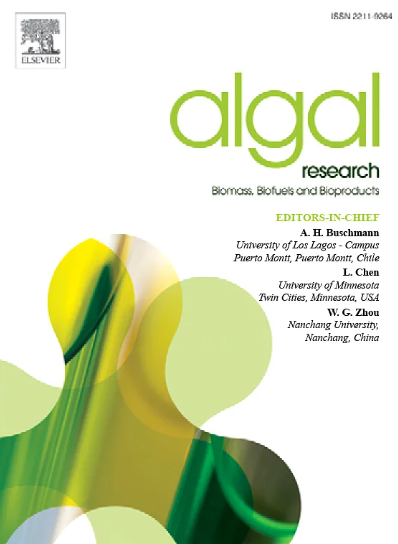微藻的增值:小球藻生物量有效转化为乙酰丙酸乙酯
IF 4.6
2区 生物学
Q1 BIOTECHNOLOGY & APPLIED MICROBIOLOGY
Algal Research-Biomass Biofuels and Bioproducts
Pub Date : 2025-06-16
DOI:10.1016/j.algal.2025.104151
引用次数: 0
摘要
微藻作为合成生物燃料、生物化学和生物材料的可持续生物资源具有重要的前景。本研究以甲磺酸(MSA)为催化剂,通过微藻热化学转化合成乙酰丙酸乙酯(EL)。为优化影响微藻合成EL的转化因子,采用单因素单次工艺在乙醇培养基中进行了反应。在反应物中加入水可以强烈抑制EL的形成。在微藻生物量为2.5%、MSA为0.5 M、温度为170℃、温度为45 min的优化条件下,碳水化合物的产率为65.76±0.57%(生物量为34.31±0.30%)。在综合严重程度(CS)为3.4之前,EL产量呈线性增加趋势,之后略有下降。最高产量在CS 3.4附近达到。结果表明,微藻是一种易获取且具有潜在价值的生物资源,而MSA是一种生态良性且高效的酸催化剂,可以用于生产有前景的生物炼制产品。本文章由计算机程序翻译,如有差异,请以英文原文为准。
Valorization of microalgae: Efficient conversion of Chlorella sp. biomass into ethyl levulinate
Microalgae have significant promise as sustainable bioresources for the synthesis of biofuels, biochemicals, and biomaterials. This study synthesized ethyl levulinate (EL) by thermochemical conversion of microalgae using methanesulfonic acid (MSA) as a catalyst. To optimize the conversion factors influencing the synthesis of EL from microalgae, the one-factor-at-a-time technique was applied to the reaction performed in ethanol media. The addition of water to the reactant strongly inhibited the formation of EL. Under the optimized conditions of 2.5 % microalgae biomass with 0.5 M MSA at 170 °C for 45 min, a 65.76 ± 0.57 % EL yield carbohydrate content basis (34.31 ± 0.30 % based on biomass amount) was achieved. Furthermore, the EL yields increased linearly with the combined severity (CS) until 3.4 and then slightly declined thereafter. The highest yields were achieved near CS 3.4. The results indicated that microalgae, which are easily accessible and potentially significant bioresources, together with MSA, an ecologically benign and highly effective acid catalyst, might be used for the production of promising biorefinery products.
求助全文
通过发布文献求助,成功后即可免费获取论文全文。
去求助
来源期刊

Algal Research-Biomass Biofuels and Bioproducts
BIOTECHNOLOGY & APPLIED MICROBIOLOGY-
CiteScore
9.40
自引率
7.80%
发文量
332
期刊介绍:
Algal Research is an international phycology journal covering all areas of emerging technologies in algae biology, biomass production, cultivation, harvesting, extraction, bioproducts, biorefinery, engineering, and econometrics. Algae is defined to include cyanobacteria, microalgae, and protists and symbionts of interest in biotechnology. The journal publishes original research and reviews for the following scope: algal biology, including but not exclusive to: phylogeny, biodiversity, molecular traits, metabolic regulation, and genetic engineering, algal cultivation, e.g. phototrophic systems, heterotrophic systems, and mixotrophic systems, algal harvesting and extraction systems, biotechnology to convert algal biomass and components into biofuels and bioproducts, e.g., nutraceuticals, pharmaceuticals, animal feed, plastics, etc. algal products and their economic assessment
 求助内容:
求助内容: 应助结果提醒方式:
应助结果提醒方式:


